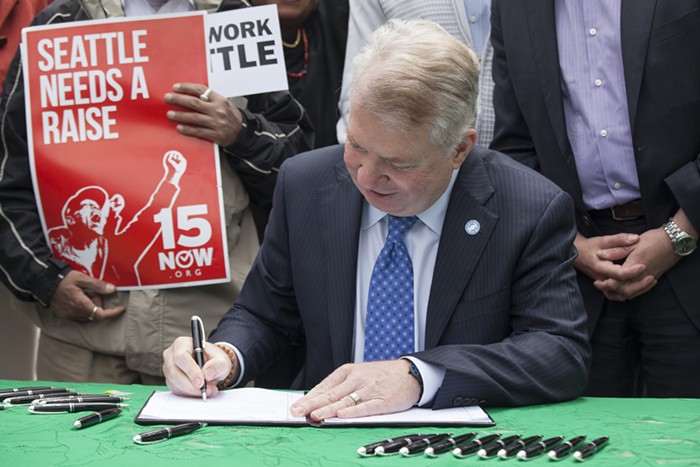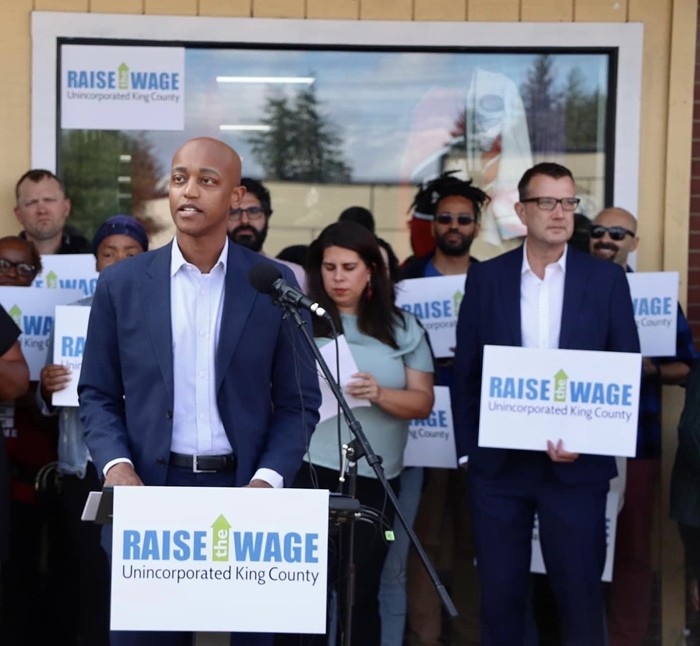Maybe the most unsettling aspect of the Supreme Court’s recent torrent of conservative rulings is just how many of them originated from the actions taken by regressive state and local governments.
We couldn’t have arrived at a federal ban on outdoor encampments without the decision of a west coast town in a “blue” state to do the same in 2023, nor would we be fearing an impending assault on the Occupational Safety and Health Administration without an Ohio corporation’s anti-labor litigation. Is the Supreme Court’s allowance of cash gifts to public officials not the result of open corruption long permitted beneath America’s statehouse rotundas, including in Indiana, where the decisive 2013 judgment taken up by the Supreme Court was first issued?
That the Supreme Court cited the common Seattle canard of the houseless resident who “refuses” shelter in order to sleep on the street in its decision should be cause for reflection for Washingtonians who see our progressive ideals as under siege by Washington, DC.
The highest court in the land has shown us a mirror of ourselves at our local lowest.
For many years in the United States, conventional political wisdom held that federal action would protect individual states from themselves by codifying the rights of minority populations, the legal protections of vulnerable groups, and the mores that make us a democracy. By etching our inalienable rights into a federal framework, the thinking went, the base prejudices of the body politic would never reach existential extremes. Briefly, this liberal consensus helped the country hit high-water marks for social and economic inclusion.
Beginning with the broad promise of economic security that the FDR Administration extended to white Americans in the midst of the Great Depression and after World War II, the feint promise of American federal protection was extended to Black Americans who won it through petition and protest.
The public’s optimism about the power of collective action seated in Washington, DC was so pervasive that even a Republican president–Richard Nixon–participated in it by forming the Environmental Protection Agency. The fact that the EPA’s founding squared with austerity-minded conservative notions of “limits” to our natural resources wasn’t the point; the point was that the logic of liberal protectionism reigned, providing at least some widely agreed upon conventions against naked attacks on humankind and the environment alike.
Under George H.W. Bush in 1990, the Americans With Disabilities Act passed, granting unprecedented recognition to one of the most politically invisible groups in the country. By then, a shift away from the legal cloak of federal protection was underway; a shift heralded by conservative strategist Lee Atwater’s infamous 1981 rant explaining the new tack conservatives took to capture power at the local level that the federal government denied them.
“You start out in 1954 by saying ‘nigger, nigger, nigger’”, said Atwater, choosing the year of a landmark Supreme Court school desegregation decision as the launchpad for his conservative lament. “By 1968, you can’t say that–it hurts you, backfires. So you stay stuff like forced busing, states’ rights, and cutting taxes and all that stuff. Now you’re getting abstract.”
For forty years, American conservatives got abstract. Faced with reproductive freedoms and anti-poverty programs, they said “states’ rights” and “cutting taxes.” Faced with integrated classrooms, they said “school choice.” Faced with increasingly diverse neighborhoods and shelter for the homeless, they said “treatment first” and “protect the tree canopy.” And they said it all while running for local office and winning.
Where America’s conservative movement couldn’t do these things directly, they deputized ostensible Democrats to do it for them, weaponizing the porous boundaries of a party that admits both Joe Biden and Bernie Sanders–Kyrsten Sinema and Cori Bush–to further dilute what little potency the term “progressive” ever had. Where conservatives couldn’t seize power outright, they planted seeds, forming think tanks like the Discovery Institute, the Heritage Foundation, and Project 2025 to normalize conservative proposals and personalities in blue states.
What’s the Washington consequence of the conservative slow burn? We can look to conservatives in sheep’s clothing, like “Democratic” 43rd Legislative District State House Representative candidate Andrea Suarez, who signed up to organize with the GOP twice this year. Equally troubling is the substantial policy agreement between already-elected local progressives and the nascent conservative takeover.
Seattle officials have said the Supreme Court ruling on encampments won’t impact city policy. Instead of fully funding and growing effective shelter and outreach services like CoLEAD and YouthCare’s Orion Center, the City is already effectively banning outdoor encampments by pushing the people in them from one corner to another. The conservative renaissance we suffer today was not a top-down coup authored swiftly from on high, but a bottom-up job that simmered slowly for decades in Democratic strongholds.
Having all but abandoned progressivism locally, we now contend with its complete demise nationally. “With support from States and cities across the country,” wrote the Court while criminalizing visible homelessness, “we now take up this task.”
This 4th of July, the republic is teetering–less pushed to the brink by the Supreme Court than walked there by a long slog that began in our city halls and our state capitols, our school board meetings and our homeowner associations. Since our current predicament grew in the petri dishes of local revanchism, there, too, must it be terminated.
We have nobody to blame but ourselves, and no one else to save us, either.
Shaun Scott is a candidate for 43rd Legislative District Washington State House of Reps, Position 2. His district includes Capitol Hill, Fremont, Wallingford, Belltown, and First Hill. He is endorsed by House Speaker Emeritus Frank Chopp and 43rd LD Position 1 Rep. Nicole Macri.



















